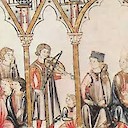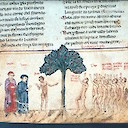Fragments of Ibn Khafajah
Mohammed Fairouz sets Ibn Kafajah
Three Fragments of Ibn Khafājah
(c. 1080)
I.
His praises rang in song akin to those of the doves
that carried his qualitites instead of necklaces
II.
We saw him in the likeness of the image of Joseph
We saw him in the likeness of the majesty of Solomon
His cloak enshrouded him as a page of temptation
Of which we read his face as its addressing line
His love is my religion and his dwelling my temple
Seeing him is my pilgrimage and remembering him my scripture
III.
In a night's darkness which is a tender face
And its breeze is a pleasant perfume
So the moisture of its dew can be captured through sipping
And the lightninc of its lips can be almost kissed
-fragments excerpted by Magda Nowaihi
-translated from Arabic by Mohammed Fairouz
Composer Mohammed Fairouz was born in London in 1985, the son of Egyptian parents. Mohammed moved to Boston where he studied composition with Gunther Schuller. Fairouz was friendly with Edward Said and has now become one of Said's most visible disciples. On NPR and elsewhere Mohammed presents a credible summary of Said's analysis of latter day American colonialism while also discussing his own music, which sometimes features prominent links into politics.
While we can point to the influence of esoteric Jewish thought on mainstream Western culture, is it fair to say that Islam's influence on the Western mainstream stops at Averroes? This is a question that needs consideration. We should consider Mohammed Ali the boxer, and Ahmad Jamal, the jazz musician.
And without a doubt, Mohammed Fairouz is exerting an influence through his music and through his unique political stance.








